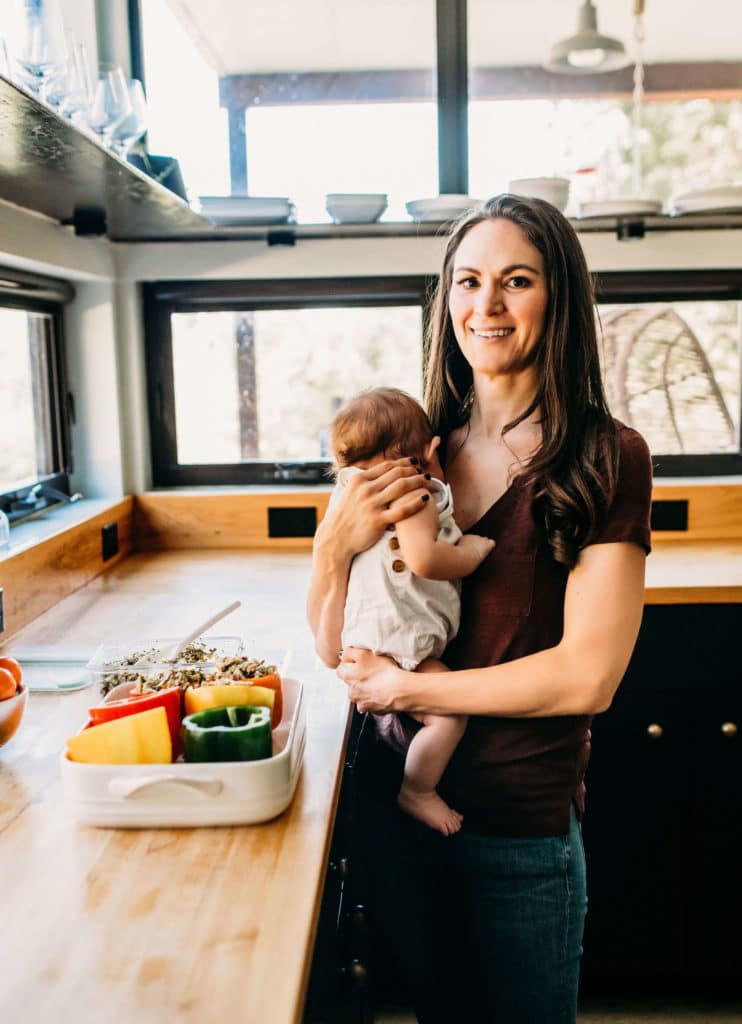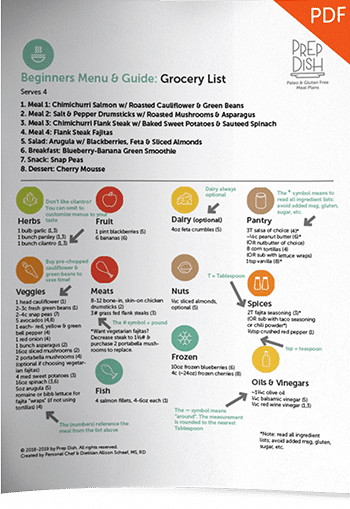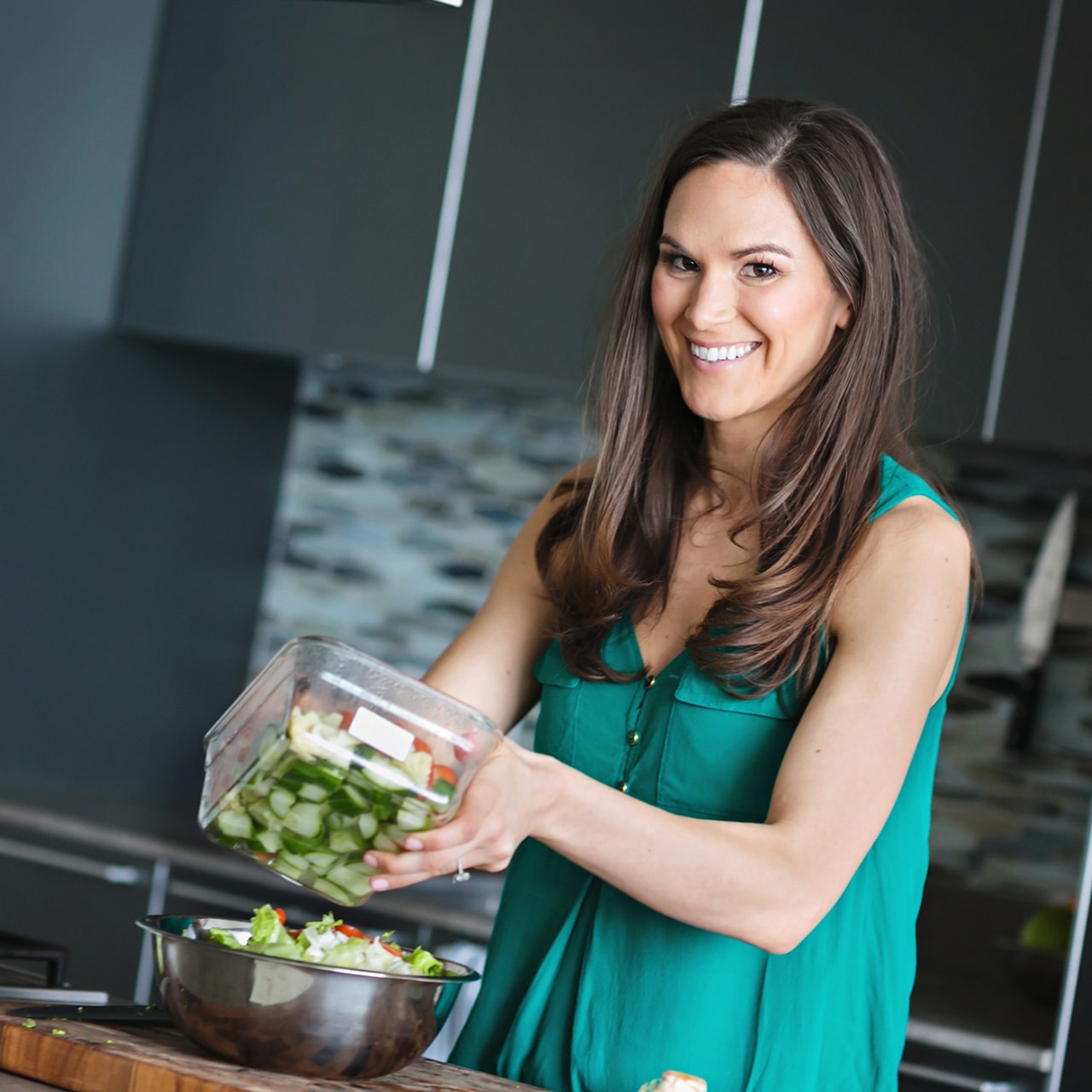Family dinner isn't just about food, it's a way to connect when life gets crazy. Here's how to pull it off, no matter what life stage you're in.
According to the Family Dinner Project, having dinner together is even more beneficial for kids' vocabulary than reading. And the benefits don't stop there!
Family dinners are also associated with higher grades, lower incidence of drug use and eating disorders in teens, and consumption of more fruits and vegetables.
While it's not always easy when life gets busy, having family dinners at least most nights is certainly a goal worth fighting for!
This is one of my biggest goals with Prep Dish – to enable families to have healthy, low-stress meals together by making the food preparation process a little bit easier and more enjoyable.
Of course, exactly what family dinner looks like changes as kids grow and interests and schedules evolve. While the biggest challenge of dining with a 3 year old may be getting them to stay in their chair, for teenagers it may be getting them to say more than two words to you.
Here are some of my family dinner tips to make things just a little bit easier at each stage. I would love to hear your ideas and what works for your family in the comments!
Family Dinner Stage 1 – No kids
Whether your life plan doesn't include kids or you just don't have them yet, family dinner is still important for couples, and presents its own challenges!
While dinnertime as a couple (hopefully!) doesn't include tantrums and food on the floor, it can be hard to fit in. Schedules are busy and couples may not think of regularly prioritizing dinner together.
Sharing a meal is a wonderful way to connect and, once you have the habit, it's likely something you'll both look forward to!
Schedule it
If dinner together every night isn't feasible, schedule it! Choose a couple of nights a week when you always have dinner together, whether it's out at a restaurant or at home.
This takes the pressure off making it happen every night, while making sure you don't accidentally go a month without having dinner together.
If your schedules are unpredictable, sit down with the calendar at the start of each month to see which dates will work.
Take Turns
Unless one of you loves cooking and the other hates it, take turns! Perhaps on Mondays one person cooks dinner and on Saturdays it's the other person's turn.
If one of you does hate cooking, their turn could simply be procuring some healthy takeout!
At-home Date Night
Cooking dinner together can be a really fun and relaxing way to spend an evening. Try cooking as an at-home date night. Choose a fun new recipe, open a bottle of wine and turn on some music. You may even find that you're able to connect more this way than in a busy restaurant.
Family Dinner Stage 2 – Young Kids (5 & under)
In many ways, family dinner with young kids is one of the hardest stages but it's also super important. This is the time when you can establish the habit and ritual of mealtimes together.
It's also the time when kids start to absorb table manners. If you model things like taking turns to talk, eating with utensils and not talking with your mouth full, they will start to pick up on them.
If both parents can't be home for dinner, don't feel limited! You can start a Saturday brunch ritual or have a quick breakfast together on busy weekdays.
Lower the bar
For young kids, it's important to have realistic expectations. A toddler may only be able to sit for dinner for 10-15 minutes and that's okay.
Make sure to set clear expectations though. Just because their dinner time only lasts 15 minutes, doesn't mean they're allowed to run around the room or hide under the table.
Try starting with the rule that they need to sit at the table until they're done eating. If that only takes 10 minutes, that's fine, but if they're getting up or playing with their food, dinner time is over.
Take a break
If you're working to establish family dinners but not finding it enjoyable at this stage, make sure to take a break!
Consider designating one night a week for a couple's dinner when you give the kids something simple and then enjoy dinner together after they're in bed.
Involve the kids
Including young kids in the process of preparing dinner is one of the best ways to get them on board.
Invite them to help with simple tasks like tearing the basil leaves or bringing plates to the table.
Family Dinner Stage 3 – Elementary Kids
This is often the stage when family dinner really becomes something enjoyable that everyone looks forward to. That's not to say it doesn't come with its challenges (picky eaters, increased homework, favorite tv shows) but it really can be fun!
Start a kids cook night
If your kids are interested, establish one night a week when they're responsible for dinner. Help them choose a recipe and make an ingredients list and let them make dinner, only helping when necessary, like with the stove.
They will feel so proud and will gradually learn new skills that will serve them for life!
Try a theme night
Theme nights can be really fun for this age and can establish more of a ritual that kids can look forward to.
This should not be a high pressure situation, keep it simple! Taco Tuesdays, Friday evening backyard picnics or Sunday breakfast for dinner are all fun and simple themes.
Use Family Dinner Conversation Starters & Games
If your kids need a little help getting involved in the conversation, try a table game!
This can be as simple as high-low (sharing the best and the hardest part of your day), would you rather (would you rather be an alien or a robot?) or I Spy (I spy something cold and delicious…).
Alternatively, try these fun Table Topics and break them out any time there's a lull in the conversation.
Family Dinner Stage 4 – Teenagers
This is one of the most important times to have family dinners as teenagers are often so busy that you may feel like you rarely see them (hard to imagine if you're still in the stage of toddlers clinging to your legs while you cook).
It can be tricky, both in terms of finding time and in inspiring good conversation that doesn't revolve around conflict.
Get their input
Teenagers are generally striving for independence and, when it comes to family dinners, you can give them some.
Next time you make a meal plan, ask your teenager if there's anything they'd like to request for dinner.
At the end of the week, ask them if they had any favorite dishes that week, or any they'd rather not see on the repeat menu.
How much they want to be involved will vary but the important thing is to make it clear that you value their opinion.
Learn a new skill together
Many teenagers despise being told what to do all of the time but as their parent, you naturally have to do this to some extent.
For a change of pace, choose a culinary skill at which you're both novices and learn it together. Whether that's making a soufflé or learning how to properly dice an onion, enjoy the process of learning alongside your teenager for a change.
Open up
Want to have some deeper conversations? Try opening up yourself.
If all you get is a lackluster “fine” when you ask how their day was, try talking about your own day instead. Don't just include the highlights. Make sure to mention moments when you messed up, when you were embarrassed or when you were anxious. If you want your teenager to be vulnerable with you, you'll likely have to take the first step.
Prep together
Not only can teenagers actually be helpful in the kitchen, but prepping food together can be a great bonding experience and a good chance to talk without any pressure. Let your teen choose the music and invite them to prep alongside you for as long as they like.
Family Dinner Recipes
Looking for some great family dinner recipes to get you started? Try my Healthy Sloppy Joes or Honey BBQ Chicken – both are major crowd pleasers!
You can also check out my roundup of 10 Gluten Free Family Meals and our 2021 Kid Favorites.
What are the challenges you face with family dinners? What works for your family? Share your ideas and pictures on Facebook, Twitter or Instagram as @prepdish in all 3 places, or leave a comment below.




0 Comments